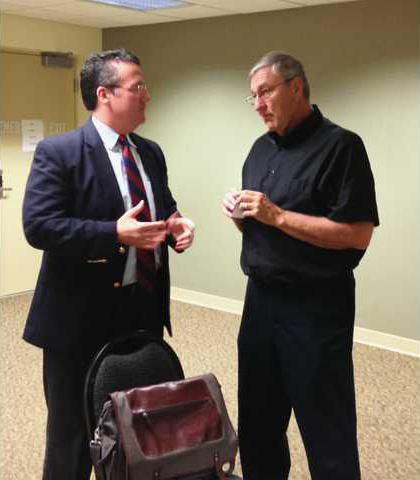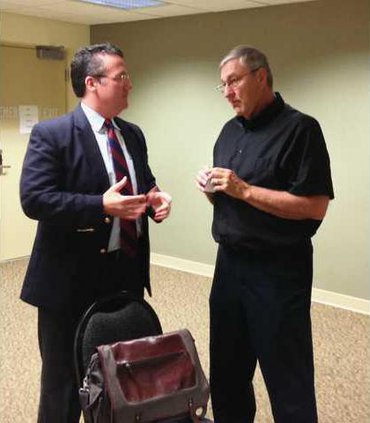Mike Zamrzla, member of Senator Jerry Moran’s staff, met with Barton County residents Tuesday morning for Open Office Hours at The Front Door in Great Bend from 10 a.m. to 11 a.m. It was an opportunity for constituents to bring their questions and concerns.
While turnout was sparse, a big issue of concern voiced by more than one person was the looming sequestration of funding for several federal programs that will go into effect Jan. 1 unless Congress and the President can come to an agreement on the nation’s budget, or Congress agrees to increase caps on the Budget Resolution before then.
Locally, the elderly and students in high school and college will be affected if the sequestration occurs, bringing across-the-board cuts that could severely weaken programs already holding on by threads after several years of stagnant if not shrinking budgets.
Funds equal to the difference of what was originally provided under the Budget Resolution, and what is actually appropriated for federal programs are taken away, locked up and put in “safekeeping” until one or the other of the above scenarios occur. Though the measure is supposed to happen across the board, some very large programs like Social Security and Defense have been exempted. That means, the smaller programs have a larger percentage of their funds sequestered to make up for the exemptions. It effectively amounts to severe budget cuts for many small but helpful programs.
Programs like Elder Care and TRIO programs administered through Barton County Community College. Come Jan. 1, they and several others face an 8.2 percent cut across the board.
TRIO cutbacks
“Basically, we received information from the White House Office of Management and Budget informing us come Jan 1. more big cuts are going to take effect due to sequestration,” said Susie Burt, administrator of the Education Opportunity Center (EOC) for TRIO. “We have huge concerns about that. We’d like to discourage any further cuts for these programs.”
TRIO has received flat funding for three years now, along with several across-the-board cuts, Burt said. To survive, some positions have been cut or consolidated. If more cuts are made, services will suffer.
Barton Community College operates two campuses, one in Barton County, and one at Fort Riley. They offer assistance with obtaining the GED or high school diplomas. Then they assist with career exploration, enrollment, campus visits, anything that can be done to ensure the client is prepared to have a successful post secondary education and life, Burt said.
Bush operates Student Support Services at the college, helping students with tutoring, applying for financial aid, and finds help for those with disabilities. Hernandez is the academic advisor for Central Kansas Upward Bound, providing help to first generation, low-income high school students to complete high school and enroll in college. Collectively, they currently serve over 1000 clients in 33 counties, Burt said.
Jerry Moran has said he is a first generation college student, Zamrzla said, and appreciates what programs like TRIO do for students.
Elder Care belt tightening
Karen Sassler with Elder Care in Great Bend also received notice the Older Americans Act, which provides primary funding for program that serves over 20 communities in southwest Kansas, will also be subject to sequestration. In addition to an effective 8.2 percent cut this year, they also face an additional 8.2 percent cut for the following two years after that.
The Older American’s Act funds the friendship meals program. Eldercare does friendship meals for all of SW Kansas and oversees Meals on Wheels. They also send workers into peoples’ homes, where they receive personal care and homeowners services, keeping them well and physically safe in their own homes. With about 40 % of clients on some type of government program, Sassler doesn’t know how much or how severe the cuts will be.
“We’re concerned about the health and safety of our clients,” she said. The last time they had a significant increase in funding was when Medicaid rates were increased in 2008.
Dennis Devlin, retired and of Great Bend, and wife Mary want to see some progress on the budget front. He’s tired of legislators dodging accountability
“Sequestration is just lazy on the part of Congress,” he said. “In an election year, who wants to be accountable for making budget cuts? That way, everyone has plausible deniability.” He said by cutting everything, legislators would not have to take responsibility for anything.
“You hit the nail right on the head,” Zamrzla said. He added Moran voted against sequestration as part of the debt limit.
“He was worried that this is what would happen,” he said. “We’d get to the end of the year and be sitting here facing this problem.” He also commented that as Moran sees it, programs subject to sequestration only account for 30 percent of all entitlement programs. “His concern is if the 70 percent of big entitlement programs like medicaid, social security and defense, aren’t taken into consideration, that other 30% is just a drop in the bucket,” he said. “You can wipe it all out, cut some valuable programs and not end up solving the problem.”
Of course, even if a budget can be agreed upon, and sequestration doesn’t happen, that doesn’t mean certain programs won’t be on the receiving end of further cuts.
“As Jerry sees it, the only way to preserve these entitlement programs, is to go through each and every spending bill as part of the appropriations committee,” Zamrzla said. He promised to bring Sassler’s and Burt’s concerns back to Moran
Moran staffer hears sequestration worries





